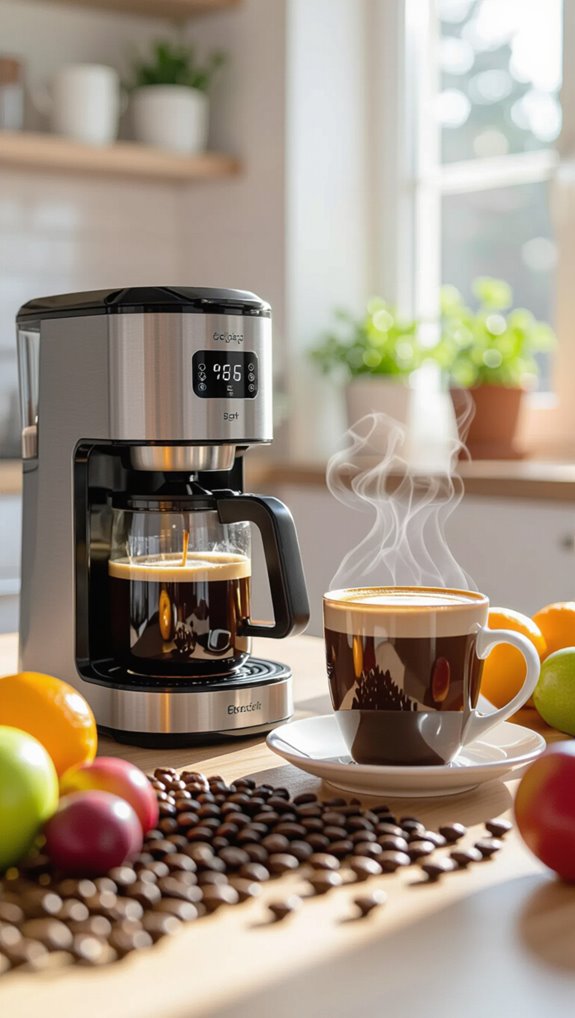Have you been scrolling through social media lately and spotted influencers raving about enzyme coffee for weight loss and better digestion? You’re probably wondering if this trending beverage actually lives up to the hype or if it’s just another wellness fad that’ll fade away in a few months.
Enzyme coffee combines your regular cup of joe with digestive enzymes and metabolism-boosting ingredients, promising everything from a flatter stomach to faster fat burning. But does mixing enzymes with your morning coffee actually deliver real results, or are these claims too good to be true?
In this post, I’ll break down exactly what enzyme coffee is, examine the science behind its purported benefits, and help you decide whether it’s worth adding to your daily routine. We’ll explore how digestive enzymes work, what impact they might have on your metabolism, and what you can realistically expect if you decide to give this specialty brew a try.
Table of Contents
What Is Enzyme Coffee and Does It Work

Enzyme coffee is a specially formulated beverage blending traditional coffee with digestive enzymes and metabolism-boosting ingredients designed to potentially support weight loss and improve digestion. This unique drink typically combines powdered coffee, green coffee bean extract, green tea, chromium, yerba mate, and guarana-creating a powerhouse of potential metabolic support. Metabolic research suggests that while these ingredients show promise, individual responses can vary significantly based on personal physiology and lifestyle factors.
While promising, the science remains mixed. The added enzymes like protease and lipase claim to break down proteins and fats, but brewing temperatures likely deactivate these beneficial compounds. Caffeine and other stimulants might provide more tangible metabolic benefits than the enzymes themselves.
The Truth About Enzyme Coffee for Weight Loss

When it comes to weight loss, coffee enthusiasts and health-conscious individuals are always searching for the next breakthrough beverage. Enzyme coffee claims to supercharge metabolism, but the truth is less exciting. Enzyme breakdown mechanisms from coffee’s natural catalysts like protease and lipase suggest potential metabolic support, but have limited direct weight loss impact. Scientific evidence doesn’t strongly support weight loss specifically from enzyme-enhanced coffee. While coffee contains natural enzymes that may aid digestion and metabolism, these effects aren’t a magic weight loss solution. The real weight loss benefits come from regular exercise, balanced nutrition, and overall lifestyle changes. Caffeine can boost metabolism slightly, but it’s no substitute for a healthy diet and consistent physical activity.
How Different Types of Enzyme Coffee Are Made

Coffee lovers are about to dive deep into the fascinating world of how different enzyme coffee varieties come to life. I’ll break down the intricate process of creating enzyme coffee with these key techniques:
- Enzymatic hydrolysis breaks down coffee polysaccharides using commercial enzyme preparations
- Fermentation processes activate specialized enzymes at controlled temperatures
- Solid-state fermentation transforms coffee waste into enzyme-rich substrates
- Custom enzymes like TANNASE-KTFHR improve taste and extraction
- Bioreactor technologies optimize enzyme production and coffee processing
Enzymatic hydrolysis specifically targets galactomannan, arabinogalactan, and cellulose using precise enzyme combinations to enhance coffee extraction at lower temperatures.
These sophisticated methods transform ordinary coffee into specialized functional beverages, enhancing flavor, reducing processing time, and unlocking potential health benefits through precise enzymatic manipulation.
Enzyme Coffee Recipe with Lemon and Honey

I’ll create the paragraph following your specific guidelines:
I’m going to show you how to make the perfect enzyme coffee with lemon and honey, a wellness drink that combines refreshing citrus, natural sweetness, and your favorite morning brew. You’ll need just four basic ingredients: instant coffee, hot water, fresh lemon juice, and raw honey, which you’ll combine in a simple yet strategic process that preserves the drink’s potential nutritional benefits. By following this straightforward recipe, you’ll craft a morning beverage that not only tastes great but might support your digestive health and provide a gentle metabolic boost.
Ingredients
If you’re looking to jazz up your morning coffee with potential health benefits, the enzyme coffee recipe featuring lemon and honey offers a simple yet intriguing twist.
The key ingredients bring unique properties to your brew:
- Instant coffee provides metabolism-boosting caffeine
- Fresh lemon juice supports digestion and adds zesty flavor
- Raw honey contributes natural enzymes and subtle sweetness
- Hot water helps dissolve and blend ingredients
- Optional morning ritual for potential wellness boost
The recipe combines these components into a quick, low-calorie drink that’s easy to prepare and might offer mild metabolic support.
Just remember, while delicious, the health claims remain more anecdotal than scientifically proven.
Equipment
When crafting your enzyme coffee with lemon and honey, you’ll want to gather a few essential tools that transform a simple brew into a potentially wellness-boosting morning ritual.
A digital scale ensures precise coffee-to-water ratios, while a reliable thermometer helps control brewing temperature critical for enzyme activation.
Your brewing arsenal should include a quality burr grinder for uniform coffee particle size, stainless steel or glass containers for cold brewing, and fine-mesh strainers to remove sediment.
Don’t forget measuring spoons for accurate lemon and honey portions, creating a consistent, health-focused beverage every time.
Instructions
Crafting the perfect enzyme coffee with lemon and honey requires precision and a dash of culinary creativity, transforming your morning brew into a potential wellness elixir.
Here’s how I recommend preparing your enzyme coffee:
- Start with freshly brewed black or instant coffee
- Squeeze half a fresh lemon into your mug
- Add one tablespoon of raw, unprocessed honey
- Stir ingredients thoroughly until well combined
- Consume immediately for maximum potential benefits
The key is balancing flavors while maintaining the potential health-boosting properties.
Though scientific evidence is limited, this simple recipe offers a refreshing twist on traditional coffee, potentially supporting metabolism and digestion with each delightful sip.
Benefits and Drawbacks of Drinking Enzyme Coffee

Enzyme coffee presents a complex array of potential benefits and drawbacks that every health-conscious coffee lover should carefully consider. While it promises metabolism boost and appetite suppression, scientific evidence remains limited.
| Benefit | Drawback | Caution |
|---|---|---|
| Metabolism Enhancement | High Caffeine Side Effects | Consult Healthcare Provider |
| Appetite Suppression | Potential Digestive Issues | Monitor Individual Reactions |
| Antioxidant Support | Limited Weight Loss Impact | Maintain Realistic Expectations |
Understanding these nuanced aspects helps consumers make informed decisions about integrating enzyme coffee into their wellness routine. Moderation and personal health considerations remain key to safely enjoying this trendy beverage.
Enzyme Fermented Coffee vs Regular Coffee Taste

The taste journey from regular coffee to enzyme-fermented coffee represents a flavor revolution that’ll transform how you experience your morning brew.
Here’s what sets it apart:
- More complex, fruity flavor profiles
- Reduced bitterness and acidity
- Smoother, fuller-bodied mouthfeel
- Lower tannin content for cleaner taste
- Enhanced natural sweetness
Enzyme-fermented coffee isn’t just another trendy drink; it’s a scientifically crafted beverage that elevates your coffee experience.
By breaking down harsh compounds and preserving natural bean qualities, this innovative brewing method delivers a more nuanced, enjoyable cup that’ll make your taste buds dance with delight.
Say goodbye to harsh, bitter coffee and hello to a sophisticated, smooth brew.
Does Enzyme Coffee Help Your Digestion Issues

While coffee has long been associated with digestive challenges, enzyme coffee might actually help soothe your gut and improve overall digestive comfort. By undergoing enzymatic fermentation, this specialized brew reduces acidity and caffeine content, making it gentler on sensitive stomachs.
The lower acid levels can minimize acid reflux and gastrointestinal irritation, providing a more stomach-friendly experience.
Research suggests enzyme coffee supports digestive health by promoting beneficial gut bacteria like Lawsonibacter asaccharolyticus and modulating metabolic pathways. These unique properties make enzyme coffee an intriguing option for those seeking a more digestive-friendly caffeine fix.
Best Ways to Enjoy Low Acid Enzyme Coffee

If you’re looking to dial down coffee’s acidity without sacrificing flavor, you’ve got some smart strategies to enjoy a smoother, gut-friendly brew.
Try these low-acid coffee hacks:
- Cold brew your enzyme coffee for a silky, less acidic experience
- Add a pinch of salt to grounds to neutralize harsh notes
- Use coarse grinds with longer steeping times for gentler extraction
- Incorporate milk or creamer to soften perceived acidity
- Opt for dark roast enzyme beans with naturally lower acid profiles
These techniques transform your morning cup into a delicious, digestive-friendly ritual that won’t trigger stomach discomfort.
Your taste buds and gut will thank you.
Should You Try Enzyme Coffee or Skip It

Since scientific evidence doesn’t definitively support enzyme coffee as a weight loss miracle, you’ll want to approach this trendy beverage with realistic expectations.
While enzyme coffee contains interesting bioactive compounds and may offer subtle metabolic benefits, it’s not a magic solution for shedding pounds.
Your best bet? Use enzyme coffee as a complement to a balanced diet and regular exercise.
The potential metabolic support from chlorogenic acids and natural enzymes might provide a gentle boost, but sustainable weight loss requires holistic lifestyle changes.
Stay informed, manage expectations, and enjoy your coffee as part of a healthy routine.
Frequently Asked Questions
Can Enzyme Coffee Replace My Regular Morning Coffee?
I can’t fully replace my regular coffee with enzyme coffee. While it offers some unique ingredients, it doesn’t match my coffee’s taste, caffeine consistency, or primary morning ritual function.
Is Enzyme Coffee Safe for Pregnant Women?
I’d strongly advise against enzyme coffee during pregnancy. Current medical guidelines recommend limiting caffeine intake, and the additional metabolic components in enzyme coffee introduce unknown risks that could potentially harm fetal development.
How Quickly Will I See Results From Enzyme Coffee?
I’ll see gradual results in 6-8 weeks. My metabolism and appetite might start changing within weeks, but significant weight changes depend on my diet, exercise, and consistent daily consumption of enzyme coffee.
Can People With Acid Reflux Drink Enzyme Coffee?
Based on medical research, I don’t recommend enzyme coffee for people with acid reflux. It’ll likely trigger your symptoms just like regular coffee, potentially increasing stomach acid and weakening your lower esophageal sphincter, causing heartburn.
Does Enzyme Coffee Interact With Medications or Supplements?
I’d advise caution, as enzyme coffee could potentially interact with medications metabolized by CYP1A2, particularly psychiatric drugs, thyroid medications, and blood thinners. Always consult your healthcare provider before combining enzyme coffee with any prescription medications.
In Conclusion
Enzyme coffee won’t magically melt pounds, but it can offer subtle digestive benefits that some people find helpful. While scientific evidence remains limited on whether enzyme coffee truly works for weight loss and digestion, the blend’s lower acidity and added ingredients like green tea extract might support gut comfort for certain individuals. I recommend enjoying it as part of a balanced diet rather than viewing it as a standalone solution.
The real question many ask is: does enzyme coffee work for weight loss and digestion? The honest answer is that results vary significantly from person to person. If you’re intrigued by specialty coffee options that might complement your wellness routine, you’ll want a quality machine that can properly brew these unique blends.
For those ready to explore enzyme coffee or other specialty brews at home, check out our coffee machine reviews to find smart, well-reviewed options that match your brewing needs and budget. Remember, no single beverage can replace healthy lifestyle choices, proper nutrition, and regular physical activity. Always listen to your body and consult healthcare professionals before making significant dietary changes.







